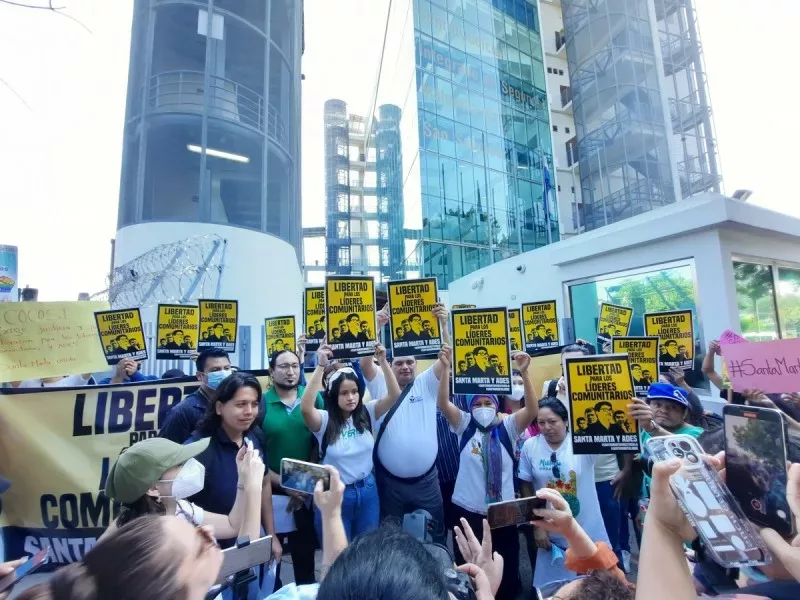On January 11, the Salvadoran government under President Nayib Bukele ordered the arrest of five prominent anti-mining activists and water defenders from the north of the country: Miguel Ángel Gámez, Alejandro Laínez García, Pedro Antonio Rivas Laínez, Antonio Pacheco, and Saúl Agustín Rivas Ortega. The five are accused of committing a murder during the country’s 12-year civil war (1980-1992) and of “illicit associations.”
The Central American Alliance on Mining rejects the accusation, stating that the Salvadoran government’s actions “do not seem like a genuine judicial action, rather, it appears to be an act of persecution and political revenge in line with the current governments’ strategies aimed at undermining community and civil society organizations.” The organization also called for the legal proceedings to be transparent and to be conducted “under normal legal processes” rather than under the provisions of the ongoing state of emergency, which has seen the Bukele government imprison two percent of El Salvador’s entire adult population.
The background of the five arrested individuals raises questions about the true motives behind their arrest. They were among the social leaders and organizers who helped launch the campaign to persuade the Salvadoran legislature to ban metal mining—a campaign that made history when the lawmakers unanimously declared El Salvador a “mining-free territory” in March 2017.
One must also take into account the country’s current economic context. According to a statement by the Institute of Policy Studies, the Bukele administration is in a difficult economic position “thanks in part to its ill-advised embrace of Bitcoin.” The Salvadoran government may have invested up to $120 million in cryptocurrency prior to its devaluation and is under enormous pressure to find new revenues. As a result, Bukele is reportedly considering overturning the ban and allowing environmentally destructive mining.
Bukele’s government is already making moves toward restarting the industry, such as joining the Canadian government-funded Intergovernmental Forum on Mining, which claims to promote “sustainable” mining practices around the world, and passing a law to create the new Directorate of Hydrocarbons, Energy and Mines.
It is more than a little suspect that the five individuals arrested on January 11 also happen to be leaders who were at the forefront of the popular and successful campaign to ban mining. But social organizations around the world have taken notice. On January 20, 251 organizations from 29 countries across the Americas, the Caribbean, Europe, and Asia signed a statement calling on the Salvadoran government to drop the charges against the five water defenders or, at the very least, release them from prison to await their trial.
Canadian Dimension: https://canadiandimension.com/articles/view/el-salvador-arrests-anti-mining-activists-as-transnational-companies-eye-investment
El Salvador detiene a activistas antimineros mientras las empresas transnacionales buscan inversiones
El 11 de enero, el gobierno salvadoreño del presidente Nayib Bukele ordenó la detención de cinco destacados activistas contra la minería y defensores del agua del norte del país: Miguel Ángel Gámez, Alejandro Laínez García, Pedro Antonio Rivas Laínez, Antonio Pacheco y Saúl Agustín Rivas Ortega. Los cinco están acusados de cometer un asesinato durante los 12 años de guerra civil del país (1980-1992) y de “asociaciones ilícitas”.
La Alianza Centroamericana de Minería rechaza la acusación, afirmando que las acciones del gobierno salvadoreño “no parecen una acción judicial genuina, más bien, parece ser un acto de persecución y venganza política en línea con las estrategias de los gobiernos actuales dirigidas a socavar las organizaciones comunitarias y de la sociedad civil.” La organización también pidió que el proceso judicial sea transparente y se desarrolle “bajo los procesos legales normales” y no bajo las disposiciones del estado de excepción vigente, por el que el gobierno de Bukele ha encarcelado al dos por ciento de toda la población adulta de El Salvador.
Los antecedentes de los cinco detenidos plantean interrogantes sobre los verdaderos motivos de su detención. Formaban parte de los líderes sociales y organizadores que ayudaron a poner en marcha la campaña para persuadir a la legislatura salvadoreña de que prohibiera la minería metálica, una campaña que hizo historia cuando los legisladores declararon por unanimidad a El Salvador “territorio libre de minería” en marzo de 2017.
También hay que tener en cuenta el contexto económico actual del país. Según una declaración del Instituto de Estudios Políticos, la administración de Bukele se encuentra en una posición económica difícil “gracias en parte a su abrazo desacertado de Bitcoin.” El gobierno salvadoreño puede haber invertido hasta 120 millones de dólares en criptodivisas antes de su devaluación y se encuentra bajo una enorme presión para encontrar nuevos ingresos. Como resultado, Bukele está considerando revocar la prohibición y permitir la minería destructiva para el medio ambiente.
El gobierno de Bukele ya está tomando medidas para reactivar la industria, como unirse al Foro Intergubernamental sobre Minería, financiado por el gobierno canadiense, que afirma promover prácticas mineras “sostenibles” en todo el mundo, y aprobar una ley para crear la nueva Dirección de Hidrocarburos, Energía y Minas.
Resulta más que sospechoso que las cinco personas detenidas el 11 de enero sean también dirigentes que encabezaron la popular y exitosa campaña para prohibir la minería. Pero las organizaciones sociales de todo el mundo han tomado nota. El 20 de enero, 251 organizaciones de 29 países de América, el Caribe, Europa y Asia firmaron una declaración en la que pedían al gobierno salvadoreño que retirara los cargos contra los cinco defensores del agua o, como mínimo, que los pusiera en libertad a la espera de juicio.
Canadian Dimension: https://canadiandimension.com/articles/view/el-salvador-arrests-anti-mining-activists-as-transnational-companies-eye-investment

